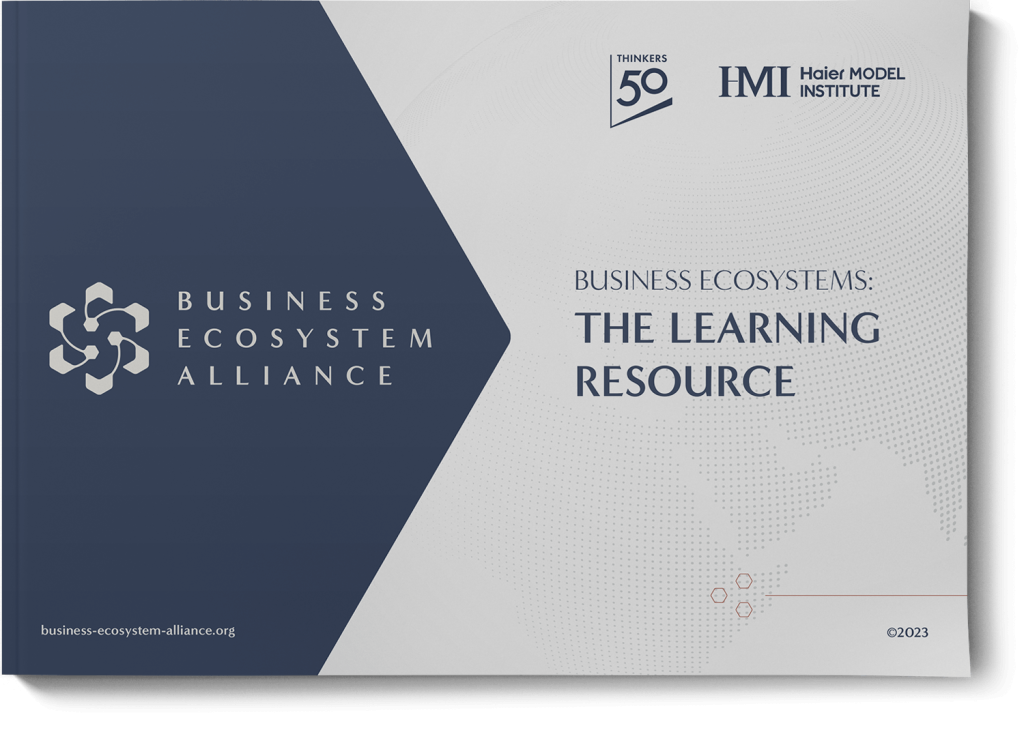Choosing Where To Play in the New Ecosystem Economy
Venkat Atluri and Miklos Dietz
Ecosystems, you’ll recall, are communities of interconnected digital and physical businesses that work across the boundaries between traditional sectors of the economy to provide what customers need. Businesses form ecosystems by partnering with one another—by sharing assets, information, and resources—and ultimately creating value beyond what would have been possible for each of them to achieve individually. Ecosystems, we should remember, are distinct from traditional partnerships among businesses like vendor and customer relationships. A vendor agrees to supply something to a customer and gets paid in return. In a typical ecosystem relationship, by contrast, multiple businesses collectively provide products or services to meet customers’ needs and share the value they have created in the process. As you begin to think practically about how you might adapt to this emerging ecosystem economy, it’s important to keep in mind this basic sense of what makes ecosystems so special and powerful.
This power can present differently to different people. Some will fixate on the daunting challenges it could pose, while others will focus on its potential to bring enormous wealth and success—and to effect a positive impact on society. As Napoleon Bonaparte famously remarked, “There are only two forces that unite men—fear and interest.” The French emperor clearly favored the former—he finished the thought by saying, “All great revolutions originate in fear, for the play of interests does not lead to accomplishment.” In the business world today, we tend to think that most important decisions are driven by a combination of the two. Whether you find fear or interest the more compelling message, it is probably the case that both will drive your thinking—and anyway, what is essential is that you heed their message. It doesn’t matter whether you’re motivated by the huge potential rewards of the ecosystem economy and the opportunity to make a positive change in society—or by fear of being made irrelevant. What matters is that you need to act.
As you start adapting to the new ecosystem economy, the first questions you need to answer are: Where will you compete now? And what should you do to evolve your value proposition? These are difficult, thorny questions, and it’s only natural to struggle with them. We will lay out for you a thoughtful, deliberative, and powerful process for finding answers to these questions. The steps we have devised include some measures you may already be taking—and some that will be new.
Of course, every company is already engaged in some manner of strategic planning. We are not proposing that you completely replace that. But what we are saying is that you will need to vastly expand your scope—and shift the nature of your planning. Doing so may push your thinking in ways that run counter to what your routine strategic planning is telling you—and you need to be prepared to wrestle with this tension. For instance, to survive in the evolving ecosystem economy, most companies will need to significantly alter their business models, which will inevitably involve painful sacrifices in the short term. You may have to cannibalize existing businesses to lay the groundwork for a future ecosystem play. Especially if the proposition you want to offer necessitates creating a new ecosystem or building a new platform, you may need to offer some services for free—and eat the associated costs.
As challenging as this new type of planning may be in the short term, it does not end there. Rather, this process needs to be constantly maintained and reassessed. Many successful ecosystem businesses got ahead not because they started with a master plan and flawlessly executed it exactly as originally conceived—rather, they succeeded thanks to their adaptability, their knack for recognizing shifting circumstances and course-correcting. A few other characteristics of successful ecosystem businesses include embracing an agile, adaptable mindset in order to compete in a highly dynamic world where customer needs and technology are taking unpredictable twists and turns. In a sense, what we’re saying is that you will be best positioned to take advantage of the effects of the ecosystem economy if you know which direction you want to go with your ecosystem business and adopt a mindset that allows for making adjustments as you go.
So many companies understand that they need to evolve their propositions but underestimate the scale at which change is needed. To do so effectively, you need to think backward from the future, not forward from the present—but this does not necessarily mean that you need to emulate tech companies or try to envision what amazing futuristic technologies we will have in 50 years. Instead, you need to fundamentally rethink how you define your customers’ needs, your customer base, your industry, your proposition, and the competitive landscape.
Venkat Atluri is a senior partner with McKinsey & Company, where he leads the Firm’s global Tech and Telecommunications practice.
Miklós Gabor Dietz, CFA, is the managing partner of McKinsey's Vancouver office. Since joining McKinsey's Budapest office in 2001, Miklós has led more than 300 engagements for both private- and public-sector organizations across 40 countries.
Excerpted with permission from the publisher, Wiley, from The Ecosystem Economy, by Venkat Atluri and Miklos Dietz. Copyright © 2023 by McKinsey & Company. All rights reserved. This book is available wherever books and eBooks are sold.


